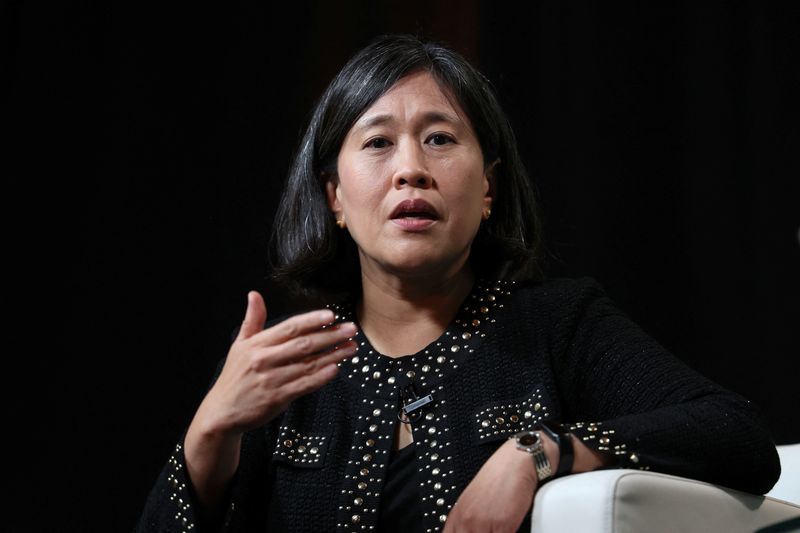By David Lawder
WASHINGTON (Reuters) - U.S. Trade Representative Katherine Tai will tell lawmakers on Tuesday that the Biden administration is "taking a serious look" at U.S. trade defense tools to deal with threats posed by China's trade and economic policies, including a review of Trump-era tariffs on Chinese imports.
In excerpts of testimony to the U.S. House of Representatives Ways and Means Committee released ahead of a hearing on Tuesday, Tai said that China's policies were causing "dependencies and vulnerabilities in multiple sectors, harming American workers and businesses and creating real risks for our supply chains.""This is why we are taking a serious look at how our existing tools are addressing this problem, including through our four-year review of the China Section 301 tariffs," Tai said.
Tai's testimony on the Biden administration's 2024 trade agenda comes just a week after U.S. Treasury Secretary Janet Yellen issued a warning to Chinese leaders that their overinvestment in production capacity for electric vehicles, solar panels and other clean energy goods was threatening an unacceptable wave of exports that would hurt producers and workers in the United States and elsewhere.
Yellen on Tuesday will commence a new dialogue with Chinese officials on "balanced growth" at the Treasury, but China trade experts say her message to Beijing on excess capacity may be an initial step toward a new "Section 301" unfair trade practices investigation that could impose new tariffs on EVs, solar panels and other imports.
Former President Donald Trump used Section 301 of the Trade Act of 1974, to impose tariffs on hundreds of billions of dollars worth of Chinese imports in 2018. The Biden administration is now nearing completion of a lengthy review of whether to renew those duties.
Tai also will tell lawmakers that she is closely reviewing a petition from five U.S. unions to open a new Section 301 investigation into China's allegedly unfair acts, policies and practices in the maritime logistics and shipbuilding sector.
"Our economic relationship with the PRC is complex, and as the President said, we want competition with China, not conflict," Tai said in her excerpts.
A major goal of the Biden administration's work on supply chains has been aimed at reducing dependence on China and diversifying sources of supply to avoid bottlenecks like those that occurred at the end of the COVID-19 pandemic, Tai said

"Reducing dependencies and vulnerabilities and strengthening supply chains is a major priority for USTR this year, which informs our work as part of the President’s Council on Supply Chain Resilience," Tai said.
The U.S. trade chief has put workers at the center of U.S. trade policy, seeking to build higher labor standards in trade negotiations with other countries. She said this includes prioritizing strong labor commitments in negotiations with Kenya and Taiwan.